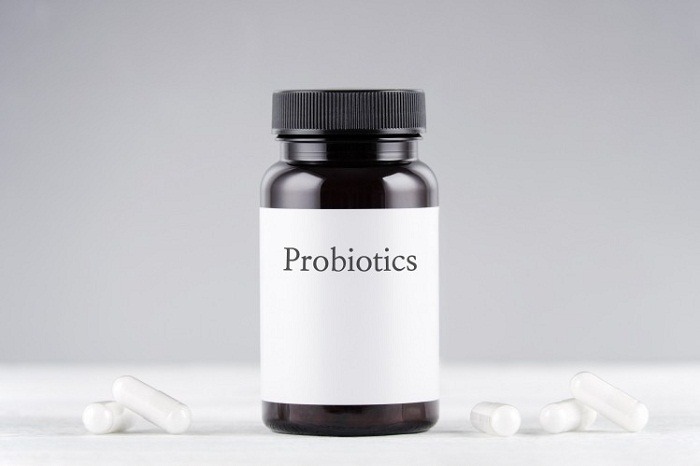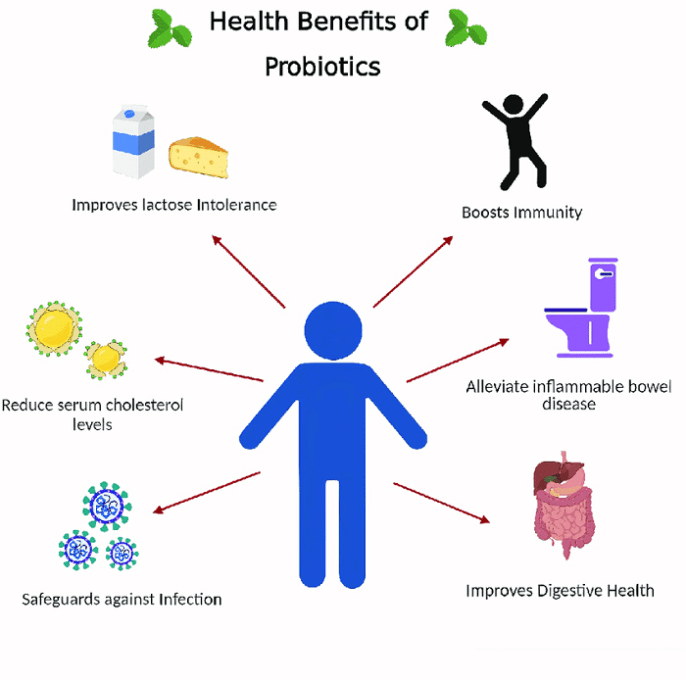What Do Probiotics Do for Men
Contents
- 1 What Do Probiotics Do for Men
- 2 Understanding Probiotics
- 3 The Gut-Brain Connection
- 4 Digestive Health Benefits for Men
- 5 Managing Gastrointestinal Disorders
- 6 Boosting Immune Function
- 7 Probiotics and Men’s Reproductive Health
- 8 Weight Management and Metabolic Health
- 9 Heart Health and Blood Pressure Regulation
- 10 Sports Performance and Recovery
- 11 Additional Insights into What Probiotics Do For Men
- 12 Choosing the Right Probiotics
- 13 Potential Side Effects and Precautions
- 14 Conclusion
- 15 FAQs
In recent years, the health and wellness arena has witnessed a paradigm shift with the growing recognition of the pivotal role played by the gut microbiome in shaping overall health. Amidst this revolution, probiotics, often colloquially referred to as “good bacteria,” have emerged as star players in the intricate dance of the gut microbiome. While the general benefits of probiotics are widely acknowledged, the specific and nuanced contributions to men’s health have yet to be fully unraveled. In this in-depth exploration, we aim to delve into the multifaceted ways in which probiotics positively influence various dimensions of men’s well-being.
Related Post: How Often Should You Take Probiotics | Ultimate Guide on Best Probiotics For Men
Understanding Probiotics

Probiotics, living microorganisms predominantly composed of bacteria and yeast, are integral residents of the human gastrointestinal tract. Their fundamental role lies in maintaining a balanced gut microbiome, a dynamic ecosystem orchestrating vital bodily functions such as digestion, metabolism, and immune responses. The complexity of the gut microbiome and the diverse roles of probiotics within it underscore their significance in supporting overall health.
The Gut-Brain Connection
Beyond their conventional role in digestion, probiotics exert a profound influence on the gut-brain axis, a complex communication network linking the digestive system to the brain. Recent research has illuminated the far-reaching impact of probiotics on mood, cognition, and mental well-being. For men, cultivating a healthy gut microbiome through probiotic consumption offers a potential avenue for alleviating symptoms of stress, anxiety, and depression, contributing to enhanced mental resilience.
Digestive Health Benefits for Men
Digestive health stands as the bedrock of overall well-being, and probiotics play a pivotal role in maintaining a harmonious gut environment. Men, akin to their female counterparts, frequently grapple with common digestive issues such as bloating, gas, and indigestion. Probiotics contribute to digestive wellness by promoting the growth of beneficial bacteria, suppressing harmful microorganisms, and aiding in the efficient breakdown of food, thereby enhancing nutrient absorption and fostering a healthy gastrointestinal environment.
Managing Gastrointestinal Disorders
Gastrointestinal disorders, including irritable bowel syndrome (IBS) and inflammatory bowel diseases (IBD), can significantly impact men’s quality of life. Emerging research indicates that probiotics hold promise in managing the symptoms of these disorders. Through mechanisms such as modulating inflammation, improving gut barrier function, and restoring microbial balance, probiotics may offer relief and support to men dealing with gastrointestinal challenges, providing a ray of hope for those seeking effective management strategies.
Boosting Immune Function
A robust immune system forms the cornerstone of overall health, and probiotics have garnered recognition for their immunomodulatory effects. Men, often facing immune system challenges due to stress and environmental factors, may find support in incorporating probiotics into their diet. Scientific evidence suggests that probiotics can enhance the activity of immune cells and regulate inflammatory responses, potentially fortifying resistance against infections and diseases.
Probiotics and Men’s Reproductive Health
While discussions around the gut microbiome and reproductive health have predominantly centered on women, emerging evidence suggests a connection in men as well. Probiotics may play a role in supporting male reproductive health by influencing sperm quality, hormone regulation, and overall reproductive function. Understanding this intersection offers potential insights into enhancing fertility and reproductive outcomes, shedding light on a previously underexplored dimension of men’s health.
Weight Management and Metabolic Health
Maintaining a healthy weight and metabolic profile is a concern for men, especially as they age. Probiotics have been investigated for their potential role in weight management and metabolic health. Some studies suggest that specific probiotic strains may contribute to weight loss, reduce fat accumulation, and improve insulin sensitivity. Delving into the intricate interplay between probiotics and metabolic parameters is crucial for understanding their relevance in promoting overall health in men and addressing the growing concerns related to obesity and metabolic disorders.
Heart Health and Blood Pressure Regulation
Cardiovascular health is a paramount concern for men, given the higher prevalence of heart-related issues. Probiotics emerge as potential allies in promoting heart health by contributing to the regulation of blood pressure, cholesterol levels, and inflammatory markers. The mechanisms through which probiotics exert these cardiovascular benefits are intricate and involve interactions with the gut microbiome and systemic inflammation. A deeper understanding of these mechanisms is essential for developing targeted strategies to mitigate cardiovascular risks in men.
Sports Performance and Recovery
For men engaged in sports and physical activities, optimizing performance and enhancing recovery are paramount. Probiotics may contribute to sports-related health by supporting gut integrity, nutrient absorption, and immune function. Emerging research suggests that the gut microbiome may play a role in modulating exercise-induced inflammation and oxidative stress, potentially influencing the recovery process for men involved in strenuous physical activities. The exploration of the symbiotic relationship between probiotics and physical performance holds promise for athletes and fitness enthusiasts seeking holistic strategies for their well-being.
Additional Insights into What Probiotics Do For Men

- Mental Clarity and Cognitive Function: Probiotics’ influence on mental health extends beyond mood regulation. Recent studies have hinted at their potential role in enhancing cognitive function and mental clarity. This is particularly relevant for men facing the cognitive challenges associated with aging. The gut-brain axis, influenced by probiotics, may play a crucial role in maintaining cognitive vitality.
- Testosterone Levels and Hormonal Balance: Hormonal balance, including testosterone levels, is vital for men’s overall health. Emerging research suggests that the gut microbiome, modulated by probiotics, may influence hormonal balance. While more studies are needed in this area, the potential connection between probiotics and testosterone levels opens up intriguing possibilities for men’s hormonal well-being.
- Antioxidant Support and Anti-Inflammatory Effects: Probiotics may contribute to antioxidant support and exert anti-inflammatory effects. Oxidative stress and chronic inflammation are implicated in various health conditions, including those affecting men. By promoting an anti-inflammatory environment and enhancing antioxidant defenses, probiotics may offer a protective shield against cellular damage and inflammation-related disorders.
- Bone Health: Maintaining strong and healthy bones is essential for men, especially as they age. There is emerging evidence suggesting that the gut microbiome, influenced by probiotics, may play a role in bone health. Probiotics may contribute to better nutrient absorption, including minerals crucial for bone density, thereby potentially supporting skeletal health in men.
- Skin Health: The connection between the gut and skin health is gaining attention. Probiotics may influence the skin’s microbial balance, potentially impacting conditions such as acne and eczema. While more research is needed, the emerging link between probiotics and skin health offers intriguing possibilities for men seeking holistic approaches to skincare.
Choosing the Right Probiotics
Not all probiotics are created equal, and the effectiveness of these microorganisms depends on various factors, including strain specificity, dosage, and individual response. Understanding the different strains of probiotics and their specific benefits is essential for making informed choices. Probiotic-rich foods such as yogurt, kefir, sauerkraut, kimchi, and other fermented foods, along with high-quality supplements, offer a diverse array of strains that can positively impact men’s health. Exploring the diverse sources of probiotics ensures a holistic approach to gut health, incorporating a variety of beneficial microorganisms.
Potential Side Effects and Precautions

While probiotics are generally considered safe for most individuals, there are instances where caution is warranted. Men with compromised immune systems, underlying health conditions, or those undergoing medical treatments should consult with healthcare professionals before incorporating probiotics into their routine. Additionally, monitoring for potential side effects such as gastrointestinal discomfort or allergic reactions is crucial, especially when initiating probiotic supplementation. An individualized approach, guided by healthcare professionals, ensures that probiotic use aligns with each man’s unique health profile.
Conclusion
In conclusion, the expansive landscape of probiotics offers a promising avenue for enhancing men’s overall well-being. From digestive health to mental well-being, immune function, reproductive health, weight management, cardiovascular health, sports performance, cognitive function, hormonal balance, antioxidant support, anti-inflammatory effects, skin health, and bone health, probiotics present a holistic approach to health maintenance. As the scientific community continues to unravel the intricacies of the gut microbiome, men are encouraged to make informed choices, incorporating probiotics into their lifestyle for a resilient and vibrant existence.
As a complementary aspect of holistic wellness, probiotics stand at the forefront of personalized health strategies, offering a path towards optimized health for men across diverse life stages. The nuanced exploration of probiotics not only sheds light on their potential benefits but also underscores the importance of ongoing research to refine our understanding of their role in men’s health. As we navigate the evolving landscape of health and wellness, probiotics emerge as key players in the pursuit of a balanced and thriving life for men.
FAQs
Should men take a daily probiotic?
The decision to take a daily probiotic depends on individual health needs. While many people benefit from consistent probiotic intake, it’s advisable to consult with a healthcare professional to determine the most suitable regimen for specific health goals.
Does probiotics help with testosterone?
Emerging research suggests a potential link between the gut microbiome, influenced by probiotics, and hormonal balance, including testosterone levels. However, more studies are needed to establish a direct connection.
Which probiotic is good for men?
Several probiotic strains, including Lactobacillus and Bifidobacterium species, offer benefits for men’s health. The choice of the right probiotic depends on individual health goals and should be guided by healthcare professionals.
Do probiotics help erectile dysfunction?
While the impact of probiotics on erectile dysfunction is not well-established, maintaining overall cardiovascular and metabolic health through probiotic consumption may indirectly contribute to sexual health.
Do probiotics increase sperm?
There is emerging research suggesting a potential influence of probiotics on sperm quality and reproductive function in men. However, more studies are needed to establish definitive connections.
Which probiotic increases testosterone?
While specific probiotic strains may influence hormonal balance, including testosterone levels, comprehensive research is still in its early stages. It’s crucial to consult with healthcare professionals for personalized advice.
Are probiotics safe for men?
Probiotics are generally safe for most men. However, individuals with compromised immune systems or underlying health conditions should consult with healthcare professionals before incorporating probiotics into their routine.
Do probiotics help male fertility?
Research suggests a potential role for probiotics in supporting male reproductive health. Probiotics may influence sperm quality and overall reproductive function, offering a potential avenue for those seeking to enhance fertility.
Who needs probiotics the most?
Individuals with digestive issues, compromised immune systems, or those seeking to optimize overall health may benefit most from probiotics. However, the decision to use probiotics should be based on individual health needs.
How long should a man take probiotics?
The duration of probiotic supplementation varies based on individual health goals. Some may choose to take probiotics consistently for long-term gut health, while others may use them for specific periods to address particular concerns.
How often should men take probiotics?
The frequency of probiotic intake depends on individual health goals. Some individuals may choose to take probiotics daily, while others may opt for intermittent use. Consulting with healthcare professionals can help determine the most suitable regimen.
What is the #1 probiotic?
There isn’t a one-size-fits-all answer to the best probiotic, as individual health needs vary. Probiotics with diverse strains, including Lactobacillus and Bifidobacterium species, are commonly recommended.
What is the strongest best probiotic?
Determining the strongest and best probiotic depends on specific health goals. Probiotics with higher colony-forming units (CFUs) and a diverse range of strains are often considered more potent, but the choice should be guided by healthcare professionals.
How long does it take for probiotics to work?
The timeframe for experiencing the benefits of probiotics varies. Some individuals may notice changes within a few days, while others may take weeks. Consistent and long-term use is often recommended for optimal results.
What are the signs you need probiotics?
Signs that may indicate a potential need for probiotics include digestive issues, recurring infections, weakened immune function, or antibiotic use. However, it’s essential to consult with healthcare professionals for personalized advice.
How do I know if my probiotic is working?
Positive signs that probiotics are working may include improved digestion, reduced gastrointestinal discomfort, enhanced immune function, and overall well-being. Monitoring changes and consulting with healthcare professionals can provide insights.
What are the side effects of taking probiotics?
While probiotics are generally safe, some individuals may experience mild side effects such as bloating, gas, or digestive discomfort. If symptoms persist or worsen, it’s advisable to seek guidance from healthcare professionals.
Who should not take probiotics?
Individuals with compromised immune systems, severe underlying health conditions, or those allergic to components in probiotic supplements should consult with healthcare professionals before using probiotics.
How do you feel after starting probiotics?
Responses to probiotics vary. Some individuals may initially experience mild digestive changes, while others may feel more energized and notice improvements in overall well-being. Consistency and individualized monitoring are key.
Do probiotics work better at night?
There isn’t substantial evidence suggesting that probiotics work better at a specific time of day. Taking probiotics with or without food is generally a matter of personal preference and convenience.
What happens when you start taking probiotics every day?
When taken regularly, probiotics can positively influence the gut microbiome, supporting digestive health, immune function, and overall well-being. Changes may be gradual, and individual responses can vary.
Why do cardiologists warn against probiotics?
While most people can safely use probiotics, individuals with heart valve issues or those at risk of endocarditis may be cautioned against probiotic use. Individuals with heart conditions must consult with healthcare professionals.
How many probiotics per day?
The recommended daily intake of probiotics varies. It’s advisable to follow the manufacturer’s instructions on the product label or seek guidance from healthcare professionals for personalized recommendations.

